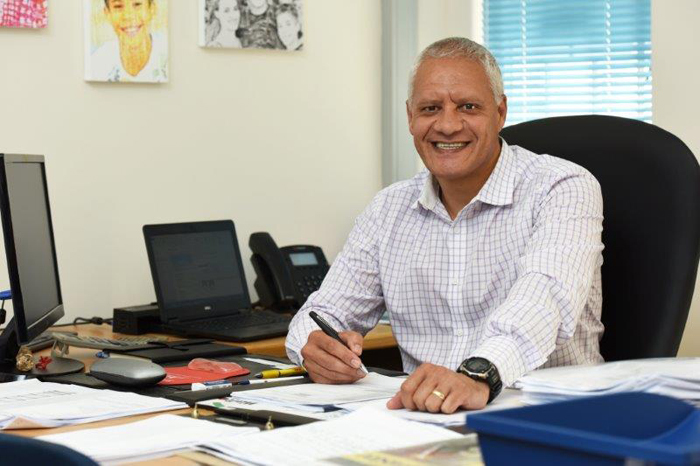'Free education for the poor on the cards'
21 January 2016 | Story by Newsroom
UCT's new executive director of finance contemplates a differential fee structure as one way to manage escalating fee tensions.
When Ashley Francis was announced as UCT's Executive Director: Finance Designate at the beginning of 2015, nobody could have foreseen the upheaval on the university and political landscape that would take place last year.
Already the university was facing massive cuts in state subsidies, and the unexpected zero percent increase in fees exacerbated the challenge. But having completed the handover from his predecessor, Professor Enrico Uliana, at the beginning of this year, he's got a few plans for the university to safely navigate these choppy waters.
Francis takes the reins at a particularly bumpy stretch of road for all South African universities, who face an uncertain fiscal future. But he is unintimidated by the complexity of the challenge.
Francis is accustomed to conquering uncharted territory, having cut his teeth in the hurly burly of the corporate world, where he was a key behind-the-scenes driver at the V&A Waterfront Group when it was being prepared for sale.
When he joined the Waterfront, its finance systems and corporate structures were in less than shiny condition, he says. After some deliberation, he restructured the staff corps and made some other major improvements, which ultimately facilitated its record sale.
In 2005, after leaving the Waterfront, Francis founded an alternative energy company. Biotech Fuels was a little ahead of its time – maybe too far ahead, he admits – and corporate funding and government support were tricky to secure. The financial meltdown of 2008/2009 made it impossible to continue, and Francis was forced to sell in 2011.
“What Sasol is today is what Biotech Fuels could have been in fifteen years with adequate but strategic government support.”
His journey to the financial world was more complex than others, too. After matriculating from Zeekoevlei High School in Lotus River, he couldn't accept offers from UCT and UWC because his parents couldn't afford the fees. Francis instead worked and studied through UNISA, eventually passing his board exams.
So he's used to a little adversity.
“Can I do the job? Of course I can do the job. Is it going to be easy? No. It's not going to be easy. What has happened in higher education in the last three months has never happened in South Africa, ever.
“So this is not going to be business as usual. But I'm up for the challenge.”
Where to for fees?
The zero percent increase was just the beginning; the push from students is now for no fees at all, and Francis recognises the need for fresh thinking around funding.
The university is considering a differential fee structure that considered what students could afford. Wealthier students and families would pay, while poor students would not pay.
“There needs to be a scaled tuition fee structure. That's a project I'm going to be starting very soon,” explains Francis, adding that it could become a template for other universities.
“That would begin to assist us to not have free education, but definitely free education for the poor.”
The university currently spends in the region of R500 million to aid students who struggle to afford the fees; that number needs to double, says Francis, and this is where the university needs to work with alumni and corporates to explore ways to realise that figure.
The state is simply unable to fund higher education to the tune of zero fees for all students, he says. Traditionally, the ratio of government funding, student fees and third-stream funding has been 40:40:20. It's conceivable that this may change to 20:40:40, says Francis. So the university must find new ways of bringing in revenue.
Thinking out of the box is thus required. Francis sees the proverbial carpet in the room – Jammie buses, buildings, the grounds and other iconic yet almost invisible landmarks – as potentially viable sources of income, via advertising.
Then there's the Protea Hotel in Mowbray, which UCT owns. Francis made some changes to the model last year which now see the university take a much bigger cut of its income – money for jam, if you will. And more opportunities for UCT to sweat its assets are abundant if you know where to look, he says.
Francis reiterates that managing a university's teetering finances is not for the faint-hearted, even though UCT is in a slightly safer position than most of its counterparts, with some cash reserves it was able to fall back on.
“The crisis is not for a run-of-the-mill accountant,” says Francis. "This is not an accounting job. This is a financial management job and one needs to be creative and innovative. You need to build a team, and build relationships and trust with the UCT community, the academic community; with the outside community."
“Cape Town, South Africa, and Africa is looking at UCT. The world is looking at UCT to pull through this crisis.”
Story by Yusuf Omar. Photo by Michael Hammond.
 This work is licensed under a Creative Commons Attribution-NoDerivatives 4.0 International License.
This work is licensed under a Creative Commons Attribution-NoDerivatives 4.0 International License.
Please view the republishing articles page for more information.









